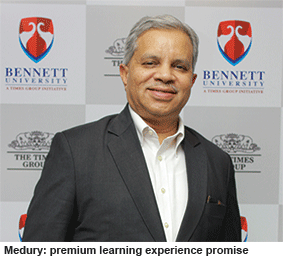 Dr. Yaj Medury is the first vice chancellor of the newly established Bennett University (BU) in Greater Noida, an hour’s drive from central Delhi. The campus is designed by RSP Architects, a renowned Singapore-based firm.
Dr. Yaj Medury is the first vice chancellor of the newly established Bennett University (BU) in Greater Noida, an hour’s drive from central Delhi. The campus is designed by RSP Architects, a renowned Singapore-based firm.
BU has a dedicated corpus of Rs.800 crore for investment in infrastructure and human resources of which Rs.240 crore has been expended for partial construction of the new varsity’s engineering and business management schools.
Newspeg. This state-of-the-art private institution launched by Bennett Coleman & Co. Ltd (BCCL) — the holding company of India’s top-ranked dailies including the Times of India, Economic Times, television channels Times Now, ET Now and over a dozen periodicals — is sited on a 68-acre campus, and will commence its first academic session in July 2016, with an intake of 60 students into an MBA programme and 240 into undergraduate engineering programmes. Tuition fees range between Rs.3.5-6 lakh per annum.
Direct talk. “BU is promoted by BCCL whose Times of India and Economic Times are trusted brands across India. Moreover, the company has already earned a good reputation for promoting high quality education initiatives such as Teach for India, Newspaper in Education, TimesPro for professional training, and the Times School of Journalism. The launch of Bennett therefore, is a natural progression for BCCL. We are confident of providing our students a premium learning experience comparable internationally, thanks to highly-qualified research-oriented faculty recruited from globally renowned institutions, including IITs and IIMs. We have also signed an academic collaboration with Babson College, ranked #1 for entrepreneurship education by US News & World Report,” says Medury.
Selected by Vineet Jain, managing director and CEO of BCCL, after a global search to head the Times Group’s ambitious foray into formal higher education, Medury seems more than equal to the job of establishing BU as one of the country’s top-ranked private universities ab initio. Medury’s career graph of 31 years includes administrative roles at the British Council, New Delhi (education division); the Delhi-based Educational Consultants India Ltd; a brief stint as the first vice chancellor of the consistently top-ranked Vellore Institute of Technology, Tamil Nadu; chief operating officer of the education initiatives of the Jaypee Group, for whom he operationalised the Jaypee University of Information Technology at Waknaghat (Himachal Pradesh), Jaypee Institute of Information Technology, Noida, and Jaypee Institute of Engineering Technology, Guna (Madhya Pradesh).
Future plans. According to Medury, this new 21st century multi-disciplinary varsity when fully operational will host 13,000 undergrad and postgrad students across its schools of engineering, management, design, law, media, public policy and liberal arts with most of the faculty resident on campus.
“It is a tradition within the Times of India Group for all our publications and ventures — Times of India, Economic Times, Times Now, Radio Mirchi etc — to be ranked #1 in their respective market segments. I have no doubt that given the generous investment BCCL has made in BU, within a decade, we will be ranked #1 in the league tables of EducationWorld, India Today and other premier publications,” says Medury.
Way to go!
Swati Roy (Delhi)
Master teacher educator
Paul Ellis is the Cambridge-based head of teaching and learning strategy at Cambridge International Examinations (CIE) board, UK — one of the largest providers of primary-secondary education worldwide — who supervises recruitment, development of teacher-trainers and management of educational content presented at school conferences.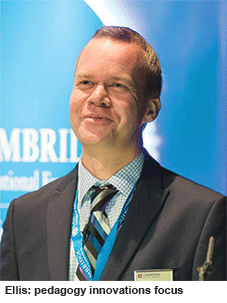
Newspeg. Ellis was in India (CIE’s regional hub for South Asia) last September to recruit and train master teachers to conduct Cambridge teacher training workshops across India. According to him, CIE has undertaken a new initiative to establish teacher training teams around the world, to enable CIE-affiliated schools to improve students’ learning outcomes. Currently, 10,000 schools in 160 countries — including 357 in India — are affiliated with CIE.
History. The Cambridge International Examinations board is a constituent unit of the renowned University of Cambridge (estb. 1209) and prides itself on formulating deeply researched syllabuses designed to develop creativity, critical thinking and problem-solving skills of students in affiliated schools who write the board’s term and annual exams. CIE officials derive great satisfaction from the fact that the board’s certification is highly respected by universities and employers worldwide.
Direct talk. “Under two new initiatives started last year, the board is expanding its network of Cambridge-accredited master trainers and increasing the number of teacher-training workshops we offer in India. These enrichment programmes and workshops will take teachers beyond prescribed syllabuses, and cover themes such as active learning, assessment, metacognition, language awareness and teaching with technology,” says Ellis, a modern languages, education and business administration alumnus of London, Durham and Cambridge universities, who acquired ten years of valuable teaching experience in schools and universities in the UK and France, prior to being appointed CIE’s head of teaching and learning strategy in 2010.
Future plans. Ellis is intent on upgrading CIE’s teacher development and training models to reflect innovations in education, new pedagogies and supplementary services. A priority programme over the next two years is also redevelopment of CIE’s secure ‘teacher support’ website. “In 2016, we will convene international teacher conferences in three countries instead of two. For students, we plan to introduce optional on-screen testing as an alternative to paper-based testing in some subjects. We intend to continuously improve our programmes to prepare students of CIE schools to meet the challenges of the 21st century,” says Ellis.
Right on!
Paromita Sengupta (Bangalore)
CSR champion
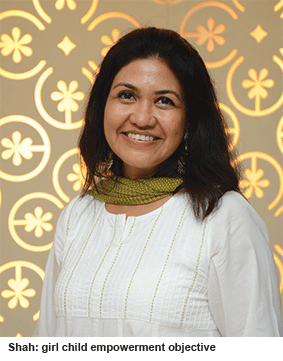 Mumbai-based Vidya Shah is CEO of the EdelGive Foundation — the philanthropic arm of the Edelweiss Group, one of India’s most respected providers of financial services including housing finance, life insurance and mutual funds management which chalked up an aggregate revenue of Rs.3,531.4 crore in 2014-15. A graduate of Bombay University and IIM-Ahmedabad, Shah was the chief financial officer of Edelweiss Group (2000-2007) which she co-founded with her husband Rasesh, a former ICICI Bank executive, in 1996. In 2008, Vidya quit corporate life and promoted the Mumbai-based EdelGive Foundation which has provided grants and donations aggregating Rs.25 crore to 60 NGOs including the Agastya International Foundation, Centre for Civil Society, Majlis, Sahyog and STIR education, which have built credible records in the promotion of science, school education and women’s empowerment.
Mumbai-based Vidya Shah is CEO of the EdelGive Foundation — the philanthropic arm of the Edelweiss Group, one of India’s most respected providers of financial services including housing finance, life insurance and mutual funds management which chalked up an aggregate revenue of Rs.3,531.4 crore in 2014-15. A graduate of Bombay University and IIM-Ahmedabad, Shah was the chief financial officer of Edelweiss Group (2000-2007) which she co-founded with her husband Rasesh, a former ICICI Bank executive, in 1996. In 2008, Vidya quit corporate life and promoted the Mumbai-based EdelGive Foundation which has provided grants and donations aggregating Rs.25 crore to 60 NGOs including the Agastya International Foundation, Centre for Civil Society, Majlis, Sahyog and STIR education, which have built credible records in the promotion of science, school education and women’s empowerment.
Newspeg. Last October, Shah was a keynote speaker at the 5th annual INK 2015 conference in Mumbai. INK is a highly acclaimed platform that brings together top thinkers and changemakers from around the world. Addressing the 320 delegates at the conference, Shah endorsed the CSR (corporate social responsibility) legislation of the Central government, under which all companies and businesses earning a net profit of over Rs.5 crore, are obliged to spend a sum equivalent to 2 percent thereof for specified human capital development causes. Going a step further, she exhorted leaders of India Inc to involve their employees with their CSR activities to fulfil the capacity building needs of NGOs supported by them.
Direct talk. “Our focus area is empowerment of the girl child and women through education, to which end we work with NGOs to enable them to conduct research, deploy funding and scale their initiatives in a professional and sustainable manner. The endowment corpus of EdelGive provided by Edelweiss Group aggregates Rs.15 crore, which is supplemented with support on strategy and leadership, HR advice, financial planning and IT solutions provided by the group’s employees. Thus far, Edelweiss employees have contributed 8,500 hours of pro-bono support to 60 NGOs, impacting over 200,000 lives,” says Shah.
Future plans. Together with trustees of the foundation, Shah has drawn up plans to expand EdelGive’s initiatives to water management projects in collaboration with companies and other foundations which she believes could be a “game changing model”. “In 2016, we are looking at increasing our grants by linking up with companies with similar objectives. Through this strategy, we hope to equip, fund and enable proven NGOs by providing them larger capital outlays to scale up their operations and improve the lives, livelihoods and future prospects of neglected citizens at the bottom of the pyramid,” she says.
Wind in your sails!
Bharati Thakore (Mumbai)
Class cloud pioneer
Neil D’Souza (31) is the Mumbai-based CEO of Zaya Learning Labs Pvt. Ltd (estb. 2013), an ed-tech startup offering affordable ICT-enabled content to schools serving children from low-income households. The company’s flagship ClassCloud solution aka Zaya blended-learning labs is currently operational in 100 schools countrywide with an aggregate enrolment of 20,000 children. 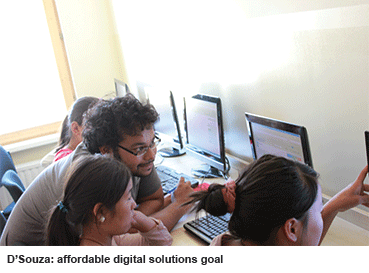
Newspeg. Last December, Zaya initiated a program in collaboration with V-shesh — a Chennai-based NGO which provides employability skills to youth with disabilities — to provide English learning skills to 400 hearing-impaired school students in Delhi, Mumbai and Chennai.
History. A computer science graduate of Mumbai and North Carolina State (USA) universities, D’Souza began his career as a software engineer with the IT behemoth Cisco Systems in California. During his three-year stint with Cisco, he developed a passion for social and education causes, freelancing as a translator with the online Khan Academy and local charities. In 2013, he returned to India and promoted Zaya, named after its first student Airun Zaya. A year later, the education-technology startup got a shot in the arm with a minority equity investment from the Pearson Affordable Investment Fund.
Direct talk. “I believe technology offers the best chance to bridge the widening gap between the rich who can afford high-quality education and those who cannot. The great majority of the country’s budget private and government schools cannot access online content because they lack computers and/or are disadvantaged by poor internet penetration and connectivity. In Zaya, we have developed a digital solution which bypasses these challenges,” says D’Souza.
USP. The distinguishing feature of Zaya is its cloud technology-inspired blended learning package — ClassCloud — which allows content to be accessed and/or beamed to classrooms without internet connectivity on low-cost tablets. “Content is pre-loaded on to a Zaya-owned cloud which is battery operated, mobile and most importantly, can be accessed without an internet connection. A micro-cloud portable server is used to store and transmit content to low-cost, hand-held tablets. Using ClassCloud, teachers can also create personalised curriculums integrating games and videos, track student analytics and use multi-level assessments,” says D’Souza, who adds that the one-time infrastructure cost to a school is a mere Rs.35,000 in addition to which licensing fee of Rs.30-35 per child per month is payable.
Future plans. D’Souza believes Zaya has got off to a good start, given the encomiums the company is receiving from client schools countrywide, and has a bright future. “In Zaya we are constantly innovating to create affordable and India-centric digital solutions to improve student learning outcomes in schools which lack monetary resources. Later this year, we will be launching a mobile app that can be downloaded by parents to supplement what children learn in school,” he says.
Wind beneath your wings!
Gagandeep Kaur (Mumbai)
New NPSC chairman
.gif) Ashok Pandey, principal of the CBSE-affiliated Ahlcon International School, Delhi (AIS), is the new chairman of the Delhi-based National Progressive Schools Conference (NPSC), elected last October for a term of two years.
Ashok Pandey, principal of the CBSE-affiliated Ahlcon International School, Delhi (AIS), is the new chairman of the Delhi-based National Progressive Schools Conference (NPSC), elected last October for a term of two years.
An alum of Allahabad University who taught physics at Mayo College, Ajmer (1985-91), Pandey was founder-principal of DPS, Jammu (1999-2003) and put in teaching and administrative stints with the International Indian School, Dammam, Saudi Arabia (1991-97) and the Amity Group (1997-99) before he was appointed principal of AIS. Ranked #8 in Delhi in the co-ed day schools category of the EducationWorld India School Rankings 2015, AIS has 2,600 students and 146 teachers on its muster rolls.
NPSC history. Registered in 1973, NPSC is an association of 150 high-end CBSE schools in India with the majority (126) sited in Delhi NCR (national capital region). Over the past four decades, NPSC has established an excellent reputation for promoting the cause of private schools in Delhi and beyond, and protecting their constitutional legitimacy (upheld by the Supreme Court in T.M.A. Pai Foundation vs. Union of India (2002)) through advocacy and educating public opinion. In the process, it has earned the respect of the Union ministry of human resource development, CBSE, NCERT, NUEPA and the Delhi government, who have invited NPSC participation in their policy and syllabus/curriculum development deliberations.
Newspeg. NPSC is set to stage its annual conference on February 16-17 in New Delhi focusing on the theme ‘Learning Revolution: Sustainable Development Goals’. Delegates will deliberate on sub themes ranging from creative curriculums to promoting a peaceful and inclusive society.
Direct talk. “In 2014 when Delhi was under President’s rule, the lieutenant governor passed an order cancelling the management quota of private unaided schools. We challenged this order in the Delhi high court which restored the management quota. The then state government had appealed to a divisional bench against the high court order and the matter is sub judice. Even as our appeal is pending, the new AAP government has introduced omnibus regulatory legislation which will greatly dilute the autonomy of private unaided schools in Delhi NCR. We hope the Central government will advise against presidential assent to these Bills. If not, NPSC will challenge them in the Supreme Court,” says Pandey.
Future plans. Pandey believes NPSC has been a “torch bearer” in the cause of promoting K-12 education in Delhi NCR and beyond state boundaries. “The conference has done good work in research and publication of papers relating to education. Recently, we launched a leadership training initiative to groom second-rung school leaders who will take over from retiring principals. Building leaders and teacher training and development is our primary focus and we are creating several leadership programmes which we are ready and willing to share with non-member institutions as well,” says Pandey.
Keep trucking!
Autar Nehru (Delhi)
Career counselling evangelist
Bernadette Gigliotti is the knowledgeable CEO of the Career Education Association of Victoria (CEAV), a Melbourne-based not-for-profit organisation, which offers training and development programmes to teachers and career counsellors in schools and colleges in Australia. Established in 1975 by the education ministry of Victoria state, CEAV is a pioneer in training career counsellors to advise and assist students about career options and pathways. Currently, CEAV (aka the Australian Centre for Career Education) has a membership of 640 career development practitioners in Australia. 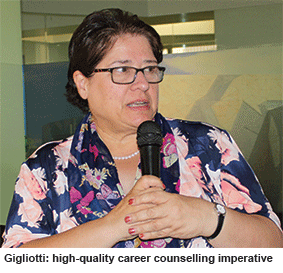
Newspeg. Gigliotti was in Mumbai last November to announce the launch of training programmes for Indian teachers/career counsellors in partnership with the Indian Career Education and Development Council (ICEDC), Mumbai, promoted by Global Education Solutions. Among the programmes offered in India is a one-year online graduate certificate course in career counselling practice. The first batch of ten teachers, supported by a grant from the state government of Victoria, is currently enrolled in the CEAV-ICEDC certificate programme.
History. An alumna of La Trobe and RMIT universities Down Under, Gigliotti began as a school career counsellor in 1994. In 2004, she was elected president of the Career Industry Council of Australia. Subsequently in 2013, she was appointed as head of careers and employment at Swinburne University of Technology and in 2014, she became CEO of CEAV.
Direct talk. “CEAV’s mission is to offer quality career education services and products to communities around the world. We achieve this through development and delivery of professional training packages to career counsellors in schools and colleges.
India has the largest youth population of the world. For the country to be able to develop its human capital optimally, provision of professional services must begin in primary school where talent and interests can be identified, encouraged and explored. We want to help Indian education institutions build the capacity of their career counsellors so that students have access to high quality career development advice and services,” says Gigliotti.
Future plans. Gigliotti is excited and enthused about CEAV’s partnership with ICEDC. “Our collaboration will enable career counsellors in India to develop the training and competencies to deliver high-quality career counselling services benchmarked with global standards. As parents and education institutions realise the critical need of enabling career guidance for students, we are confident the number of teachers enrolling in our training programmes will grow substantially,” she says.
Swagatham!
Dipta Joshi (Mumbai)